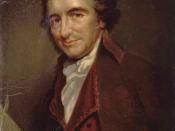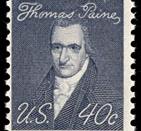Britain's taxation on the American colonists greatly affected the relationship between the two nations. Moreover, the colonists were not being represented. The feeling of deprivation not only angered the Americans, but may have also opened their eyes to see the need of a revolutionary movement.
Thomas Jefferson states in A Summary View of the Rights of British America that they "possessed a right, which nature has given to all men." The British deprived the colonists of these rights when they did not allow a representative in the House of Commons, as decided in the Resolutions of the Stamp Act Congress of 1765. This was especially unfair for the colonists for they were not only being taxed, but also received nothing in return for their own benefit. Additionally, the taxes did not profit the colonist itself. Rather, all tax profits went to Britain. It was a way for the British to reimburse the financial debts from the Great War for Empire.
Taxation on the colonists was a way the British "liquidated its war debt," as stated in Document N. As said in the Declaration of the Causes and Necessity of Taking Up Arms (Document I), The colonists did not give consent to Britain to take away their money by exploiting the land by heavy taxes. They felt that only they had the power and the right to tax themselves.
As new heavy taxes piled upon each other, the colonists realized even more the need of an outbreak from Britain and the destruction it has brought upon the colonists. Thomas Paine explains in Common Sense that "there is something very absurd in supposing a continent to be perpetually governed by an island." Paine is saying that a small island like Britain cannot rule a big continent, as a small child cannot rule...


